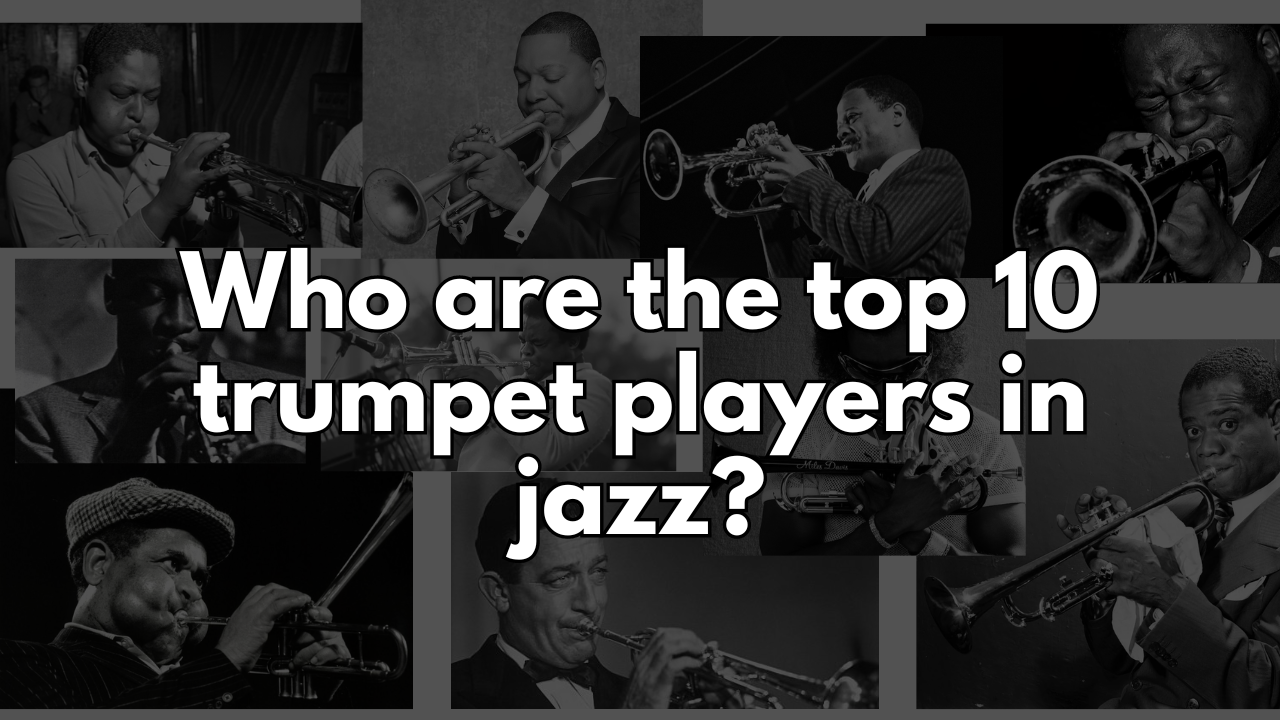Jazz music has been created by many talented musicians, who, despite different origin and background, shared much in common such as devotion to music, determination in their goals, persistence, and an interest in experimentations. Inspired by experienced players and their fellow musicians, they tried to push the limits of their instruments, left their comfort zone seeking their unique sound and thus very often laid the foundation for new jazz genres, helping music evolve and become richer. In this article, we will explore the top 10 trumpet players who revolutionized jazz.

1. Louis Armstrong

Raised in a poor neighborhood called “The Battlefield”, with an education limited only to the fifth-grade, Louis became one of the best-known American trumpeters of the 20th century and a real king of jazz. His decision to pursue a musical career was accidental, made by Louis during his 18-month stay in a detention center, the Colored Waif’s Home for Boys, as punishment for firing a pistol in the street during a New Year’s Eve celebration. That was the place where he discovered music and learned to play bugle and cornet. Louis Armstrong is mostly associated with bands such as Hot Five and Hot Seven, with whom he released numerous notable records featuring stunning trumpet solos and Armstrong’s unique vocal improvisations, also known as scat singing, using wordless syllables. In addition to his fame as a king of jazz, Louis Armstrong was also an ambassador of the U.S. State Department, who regularly went on charity tours abroad.
2. Miles Davis

This trumpeter contributed to reshaping jazz music to what we know today. Having started his musical journey very early, Miles soon earned a reputation as a gifted young player who later, in the 1940s, became to be associated with the bebop movement. Miles Davis’s playing style combined fast-paced improvisations and notable technical skills, which were absolute novelties for that time and challenged norms. His Miles Davis Quintet was known for much softer and melodic trumpet lines. His album “Kind of Blue” released in 1959 and featuring modal improvisation is still considered one of the most remarkable creations in the history of jazz. In the 1960s, Miles Davis contributed to the birth of jazz fusion when he started to use electric instruments and added rock and funk elements in his music.
3. Dizzy Gillespie

Dizzy is known as a key musician in the bebop movement and the jazzman who played the trumpet with a bent bell, after an incident happened in the backstage when someone fell on his instrument but he liked the sound. Inspired by the music of Roy Eldridge heard on the radio, Dizzy decided to play jazz. He taught himself how to play the trumpet and trombone, actively participated in various bands and attended music classes during a young age. His own orchestra appeared in the 1940s and gained a reputation as a large jazz ensemble, featuring multifaceted repertoire, great virtuosity, and the stunning combination of bop and Afro-Cuban jazz, which Dizzy called “Cubop”. Thus, Dizzy also contributed to the development of the Afro-Cuban jazz style. What set him apart from his fellow musicians was his high-pitched trumpet style and rapid, complex runs, inspired by Dizzy’s idol, Roy Eldridge.
4. Clifford Brown

Clifford Brown started playing the trumpet at the age of ten, inspired by his father. He drew inspiration from influential jazz figures such as Dizzy Gillespie and Fats Navarro. What set him apart were his improvisational skills and clear tone. Clifford Brown collaborated with West Coast musicians, the well-known Art Blakey quintet, for whom Clifford recorded his solos during a live performance at Birdland jazz club. He also played in the Brown-Roach Quintet, which he stablished together with Max Roach. The quintet became one of the most notable jazz bands of that time. Brown demonstrated great skills while playing ballads and rapid jams. His playing style featured high registers and high rhythmic patterns.
5. Harry James

This musician is a remarkable representative of the swing music and big bands era. Starting his first steps towards music at taking trumpet lessons from his father, in his teenage years Harry was already a leader of the band in Christy Brother's Circus. At the age of 21 he became the winner as a trumpet soloist in the prestigious annual contest of Texas. Also, during that time he played in Benny Goodman's band. His great ability to sight-read music without prior rehearsal, contributed to his nickname The Hawk. With his own band “Harry James and His Orchestra” founded in 1939, which earned him a reputation as the youngest bandleader, he recorded the song “You Made Me Love You”, which soon became a huge hit and earned the fifth position on Billboard's National Best Selling Retail Records chart. Harry James’ playing style featured a cleat tone, emotional solos and virtuosic technical skills such as heavy vibrato technique, half valve and lip glissandi, valve and lip trills, as well as valve tremolos.
6. Wynton Marsalis

This musician is known as the “Pied Piper of Jazz” and the “Doctor of Swing”, with a rich repertoire featuring classical, jazz and alternative music. From his early years he was actively involved in music and cultural community as his father was a musician himself and often met with his fellow musicians at home. His main source of inspiration was Maurice André, who inspired him to dig deeper into classical music. Previously performed with the New Orleans Philharmonic orchestra, Wynton discovered the jazz scene after his arrival in New York. His talents didn’t go unnoticed, and soon he set to the road with Art Blakey and the Jazz Messengers for their tour. Marsalis also played and toured with his own quintet founded with his brother. He has always liked to experiment with blues and swing motives, believing in the great power of music to influence people’s consciousness. Nowadays, he continues to work in various genres and creates jazz-influenced chamber and symphonic music for American and world-renowned ensembles.
7. Clark Terry

Starting his career in the 1940s from performing in local clubs, Clark Terry has become one of the most impressive musicians of the mid-20th century. As a jazz man he stood out thanks to his lyrical trumpet playing, full of fine improvisations. He was the one whom Quincy Jones and Miles Davis considered their huge inspirations early in their musical career. Terry played in the Duke Ellington’s orchestra as a soloist for eight years. However, his biggest achievement was the collaboration with the Tonight Show band, led by Johnny Carson. Terry earned the reputation as the first African American who performed in the band on a major US television network. In addition to his passion for music, he also liked to teach jazz and eagerly shared his knowledge through workshops and classes.
8. Fats Navarro

This musician’s name is synonymous with the bebop style of the 1940s, since he is considered one of its founders. Jazz enthusiasts know Fats’ style as melodic, featuring a warm tone and improvisations. Navarro started from playing piano and discovered the trumpet when he was thirteen. After his graduation from Frederick Douglass High School, he started playing with Albright’s band. Later, after having refined his skills as a trumpeter, he joined Russell's group. Fats Navarro also collaborated with Billy Eckstine and his band known as the one where many prominent musicians played. Navarro also worked with Andy Kirk, however one of his most productive collaborations was with pianist Tadd Dameron, with whom he recorded for Blue Note. When Navarro felt tired of touring with big bands, he switched to bebop. During 1946–1948 he performed with many talented musicians such as Kenny Clarke, Coleman Hawkins, Eddie "Lockjaw" Davis, Howard McGhee, and Illinois Jacquet.
9. Booker Little

Despite his short career and life, Booker Little has entered the music history of jazz of the 1950s as a notable figure. Born into the musical family, he showed interest in this art from early years, starting from playing trombone and clarinet and then mastering a trumpet. During his studying at the Chicago Conservatory, he met Sonny Rollins who inspired him to seek his own sound and thanks to who he also met Max Roach, whose band, Max Roach + 4 Little, Booker joined as a trumpeter and with whom they recorded two albums. This collaboration allowed others to see Little’s skills, also with them he had an opportunity to appear at ABC's Stars of Jazz television program. Booker also collaborated with Eric Dolphy, Freddie Hubbard, Frank Strozier, Slide Hampton, and Teddy Charles.
10. Freddie Hubbard

This musician has a reputation as one of the most impressive jazz trumpeters of the 1960s and 1970s, who worked in bop, hard-bop and post-bop styles. In addition to the trumpet, he also played the tuba, flugelhorn, French horn, and mellophone. He had his first recording with Montgomery Brothers, when he was a teenager. Later he also founded his own band Jazz Contemporaries. Inspired by great musicians such as Miles Davis and Clifford Brown, Freddie Hubbard developed his own sound, featuring fast pace, impressive improvisations and the perfect combination of power and lyricism. His career reached its peak after he moved to New York and impressed the local scene with his mature trumpet playing style. He shared the stage with Philly Joe Jones, Sonny Rollins, Slide Hampton, Eric Dolphy, and Quincy Jones.
Conclusion
We hope this article has helped you discover more facts about the world-famous trumpet players who revolutionized jazz music. Of course, this is not the entire list of the greats from the jazz world. Follow our updates as we regularly publish articles about musicians as well as share useful tips for your practice.
For trumpeters of all skill levels, we offer a wide range of trumpet accessories. You can also buy our custom trumpets, upgraded with KGUmusic parts and accessories.



 https://kgumusic.com/pages/about-us
https://kgumusic.com/pages/about-us
2 comments
As a jazz trumpet player ….Louis Armstrong is still father of jazz.
I was impressed with Louis Armstrong at age 10 in 1938
Then Harry James and almost
Every players of Jazz since and I
Am now age 96